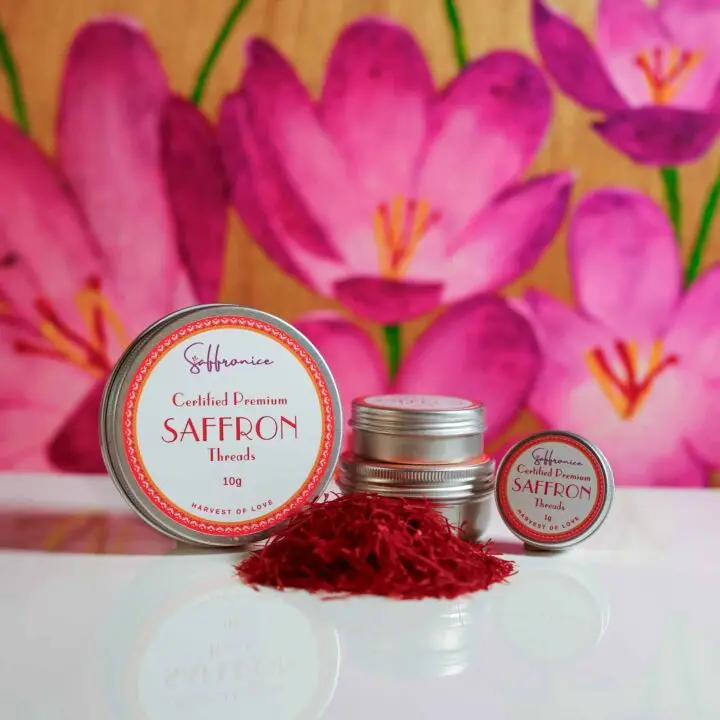Saffron, the world’s most expensive spice, has been used for nearly 4,000 years across diverse medical traditions. Derived from the delicate crimson stigmas of the Crocus sativus flower, this precious spice contains powerful antioxidants, including crocin, crocetin, safranal, and kaempferol—compounds that research suggests may support mental health.
Clinical studies demonstrate that saffron can provide benefit for mild to moderate depression, with some research showing effects comparable to conventional antidepressants but with potentially fewer side effects. The spice is also being investigated for improving mood, reducing anxiety symptoms, and helping individuals manage stress more effectively.
🔑 Key Takeaways:
- Saffron has thousands of years of use in traditional medicine for mood-related conditions
- Clinical studies show efficacy for mild to moderate depression, with large effect sizes compared to placebo
- Similar effectiveness to some traditional antidepressants, but with potentially fewer side effects
- Unique chemical compositions, including antioxidants, may contribute to mood-boosting effects
- Should be used as complementary support, not a replacement for professional mental health care

Understanding Saffron: Nature’s Golden Spice
Saffron comes from the delicate purple crocus flower and boasts a rich medicinal history spanning millennia. For centuries, this precious spice has been valued in Asian and Persian traditional medicine for treating numerous ailments, including mood disorders, digestive issues, and inflammatory conditions.
Historical Use in Traditional Medicine
Saffron’s medicinal applications date back thousands of years, with ancient healers recognizing its versatility for treating various conditions. Historical medical texts document saffron’s use for:
- Managing melancholy and mood disturbances (ancient terms for depression)
- Reducing inflammation and pain
- Supporting digestive health
- Treating skin conditions
- Enhancing overall vitality
Its ability to combat inflammation and protect against cellular damage has made it valuable in addressing chronic conditions. Ancient physicians from Hippocrates to Avicenna documented saffron’s therapeutic applications, creating a foundation of traditional knowledge that modern science continues to validate.
What Makes Saffron Unique
Several factors contribute to saffron’s exceptional status:
Distinctive Compounds: Saffron’s vibrant red-orange color comes from unique carotenoid compounds like crocin and crocetin, which contribute significantly to its therapeutic properties.
Labor-Intensive Harvesting: Each Crocus sativus flower produces only three delicate stigmas. Harvesting requires meticulous hand-picking at dawn when flowers first open. This intensive process—requiring approximately 75,000 flowers to produce just one pound of dried saffron—makes it extraordinarily expensive, costing $500 to $5,000 per pound.
Geographic Concentration: Most authentic saffron originates from Iran, which produces approximately 90% of the world’s supply. Other notable producing regions include Spain, Greece, and Kashmir, each offering distinct quality characteristics.
Food Scientist’s Note: The extraordinary cost of authentic saffron has unfortunately led to widespread adulteration in the marketplace. Understanding quality markers becomes essential when purchasing saffron for therapeutic purposes.
The Science Behind Saffron’s Properties
Recent scientific investigations have begun illuminating how saffron’s bioactive compounds affect human physiology. Research demonstrates that saffron’s components can:
- Modulate neurotransmitter systems involved in mood regulation
- Provide neuroprotective effects that support brain health
- Reduce inflammatory processes linked to depression
- Combat oxidative stress that damages neural tissue
- Support healthy stress response systems
These mechanisms help explain saffron’s scientifically validated benefits for mood and mental well-being.
| Bioactive Compound | Primary Properties | Potential Mental Health Benefits |
|---|---|---|
| Crocin | Anti-inflammatory, antioxidant, antidepressant | Mood elevation, neuroprotection |
| Crocetin | Anti-inflammatory, neuroprotective | Stress reduction, cognitive support |
| Picrocrocin | Bitter compound with bioactive properties | Neurotransmitter modulation |
| Safranal | Antioxidant, antidepressant, anxiolytic | Anxiety reduction, mood stabilization |
Saffron for Depression: Clinical Evidence and Research
Depression affects over 300 million people worldwide, creating urgent demand for effective, well-tolerated treatment options. The growing body of clinical research on saffron suggests it may offer valuable support, particularly for mild to moderate depression.
Major Clinical Findings
A comprehensive 2019 systematic review and meta-analysis examined multiple randomized controlled trials investigating saffron’s effects on depressive symptoms. The analysis revealed that saffron supplementation significantly improved depression scores compared to placebo, with effects comparable to conventional antidepressants.
Key Research Findings:
Efficacy Studies: Multiple high-quality studies demonstrate that 30mg of saffron extract daily for 6-8 weeks produces clinically meaningful improvements in major depression symptoms. Effect sizes in these studies often match or exceed those seen with standard antidepressant medications.
Comparative Trials: Head-to-head studies comparing saffron to SSRIs (selective serotonin reuptake inhibitors) like fluoxetine (Prozac), imipramine, and citalopram have shown comparable efficacy, with saffron groups experiencing similar symptom reduction.
Safety Profile: Across multiple studies, saffron demonstrated superior tolerability compared to conventional antidepressants, with significantly fewer reports of common side effects like nausea, drowsiness, sexual dysfunction, and weight changes.
Animal Research: Preclinical studies in animal models provide additional mechanistic insights, showing saffron’s ability to modulate stress responses, reduce anxiety-like behaviors, and promote neuroplasticity—the brain’s ability to form new neural connections.
| Comparison Factor | Saffron | Conventional Antidepressants |
|---|---|---|
| Efficacy for Mild-Moderate Depression | Comparable to fluoxetine, imipramine, and citalopram | Effective, though the superiority over the placebo varies |
| Common Side Effects | Minimal (occasional mild digestive upset) | Frequent (nausea, drowsiness, sexual dysfunction, weight changes) |
| Onset of Action | 4-6 weeks for full effects | 4-8 weeks typically |
| Safety Profile | Generally well-tolerated at recommended doses | Variable; requires medical monitoring |
Important Context: While research is encouraging, saffron should not replace professional mental health care or prescribed medications without medical supervision. These studies typically focus on mild to moderate depression rather than severe cases requiring intensive treatment.
How Saffron Works in the Brain
Understanding saffron’s mechanisms of action helps explain its therapeutic potential for mood disorders. Research identifies multiple complementary pathways through which saffron may support mental health.
Neurotransmitter Regulation
One of saffron’s primary mechanisms involves modulating neurotransmitter systems, particularly serotonin—the neurotransmitter most closely associated with mood regulation.
Serotonin Reuptake Inhibition: Studies suggest that saffron compounds inhibit serotonin reuptake, similar to how SSRI antidepressants work. By preventing serotonin from being reabsorbed too quickly by neurons, saffron helps maintain higher levels of this mood-regulating neurotransmitter in brain synapses.
Multi-Neurotransmitter Effects: Beyond serotonin, research indicates saffron may also influence dopamine and norepinephrine systems—neurotransmitters involved in motivation, pleasure, and energy. This multi-target approach may contribute to its broad mood-supporting effects.
The mood regulation properties of saffron appear to work through these neurotransmitter pathways while offering a gentler profile than pharmaceutical interventions.
Antioxidant Properties
Oxidative stress—an imbalance between harmful free radicals and protective antioxidants—plays a significant role in depression’s development and progression. Brain tissue is particularly vulnerable to oxidative damage due to its high metabolic activity and lipid content.
Saffron’s powerful antioxidants, particularly crocetin and safranal, provide robust protection against oxidative damage:
- Neutralize Free Radicals: Saffron compounds directly scavenge harmful reactive oxygen species
- Enhance Antioxidant Enzymes: Upregulate the body’s natural antioxidant defense systems
- Protect Neural Membranes: Shield brain cell membranes from lipid peroxidation
- Support Mitochondrial Function: Maintain cellular energy production in neurons
This antioxidant protection helps preserve brain health and may counteract oxidative processes contributing to depression.
Anti-inflammatory Effects
Mounting evidence links chronic low-grade inflammation to depression risk and severity. Inflammatory markers like cytokines and C-reactive protein are often elevated in individuals with depression, suggesting that inflammation may directly contribute to mood disorders.
Saffron’s anti-inflammatory properties address this connection through multiple pathways:
- Cytokine Modulation: Reduces pro-inflammatory cytokines like IL-6 and TNF-alpha
- Inflammatory Pathway Inhibition: Blocks NF-κB and other inflammatory signaling cascades
- Microglial Regulation: Modulates brain immune cells that can contribute to neuroinflammation
- Blood-Brain Barrier Protection: Maintains barrier integrity to prevent peripheral inflammation from affecting the brain
By reducing neuroinflammation, saffron may address one of depression’s underlying biological mechanisms, offering benefits that extend beyond symptom management to target root causes.
Food Scientist’s Note: The synergistic action of saffron’s multiple bioactive compounds—working through complementary mechanisms—likely explains why whole saffron extracts demonstrate robust effects that isolated compounds cannot replicate. This represents a key advantage of natural remedies over single-molecule pharmaceutical approaches.
Comparing Saffron to Traditional Antidepressants
For individuals considering natural approaches to managing depression, understanding how saffron compares to conventional antidepressants provides important context for informed decision-making.
Efficacy Comparison
Multiple meta-analyses examining pooled data from numerous clinical trials have found no statistically significant difference in efficacy between saffron and commonly prescribed antidepressants for mild to moderate depression. This remarkable finding positions saffron as a potentially viable natural alternative.
Study Examples:
Saffron vs. Fluoxetine (Prozac): A 6-week randomized controlled trial found that 30mg daily saffron extract produced depression symptom improvements statistically equivalent to 20mg daily fluoxetine, with both groups showing significant improvement over baseline.
Saffron vs. Citalopram: Another study comparing saffron to the SSRI citalopram demonstrated comparable reductions in depression and anxiety symptoms in patients with mild to moderate depression over 6 weeks of treatment.
Saffron vs. Imipramine: Research comparing saffron to the tricyclic antidepressant imipramine showed similar efficacy, with saffron offering better tolerability and fewer side effects.
Side Effect Profile
One of saffron’s most compelling advantages lies in its superior side effect profile compared to conventional antidepressants:
Common Antidepressant Side Effects (Often Absent with Saffron):
- Sexual dysfunction and decreased libido
- Significant weight gain
- Drowsiness and fatigue
- Nausea and gastrointestinal distress
- Emotional blunting or numbness
- Discontinuation syndrome when stopping
Saffron’s Tolerability: Clinical trials consistently report that saffron is well-tolerated, with most participants experiencing no adverse effects. When side effects do occur, they’re typically mild and transient—occasionally including minor digestive upset that resolves with continued use.
Important Considerations
While these comparisons are encouraging, several crucial points merit emphasis:
Severity Matters: Most saffron research focuses on mild to moderate depression. Severe depression, especially with suicidal ideation, requires immediate professional intervention and comprehensive treatment approaches.
Not a Replacement: Saffron should complement, not replace, appropriate medical care. Individuals currently taking antidepressants should never discontinue medications without medical supervision, as this can cause dangerous withdrawal effects.
Individual Variation: Like all treatments, response to saffron varies among individuals. What works well for one person may be less effective for another.

Recommended Dosage and Safety Guidelines
Understanding appropriate dosing and safety parameters ensures saffron use supports health without causing harm.
Optimal Dosing for Depression
Clinical research provides clear guidance on effective dosing for mood support:
Standard Therapeutic Dose: Most studies demonstrating efficacy for depression use 30mg of standardized saffron extract daily, typically divided into two 15mg doses taken morning and evening.
Duration for Effects: Like conventional antidepressants, saffron requires consistent use over time. Most individuals notice initial improvements within 2-4 weeks, with full benefits emerging after 6-8 weeks of regular supplementation.
Long-term Use: Studies examining saffron use for up to 12 months show sustained benefits without tolerance development, suggesting it can be used long-term when beneficial.
For comprehensive dosage information across various applications, consult detailed guidelines developed from clinical research.
Safety Parameters and Precautions
While generally safe at recommended doses, saffron does have important safety considerations:
Safe Dose Range:
- Therapeutic dose: 30-50mg daily (safe and effective)
- Maximum safe dose: Up to 1.5 grams daily (though higher doses offer no additional benefit)
- Toxic dose: Above 5 grams can cause toxicity
- Potentially fatal dose: 12-20 grams can be lethal
Potential Side Effects: At recommended doses, side effects are rare and mild. However, being aware of possibilities helps with informed monitoring:
- Mild digestive upset (occasional)
- Dry mouth (rare)
- Dizziness (rare)
- Headache (rare)
For detailed information on potential side effects and contraindications, review the comprehensive safety data.
Who Should Avoid or Use Caution
Certain populations require special consideration:
Pregnancy and Nursing: High doses of saffron may stimulate uterine contractions. Pregnant women should avoid therapeutic doses and use only culinary amounts. Nursing women should consult healthcare providers.
Bipolar Disorder: Saffron may potentially trigger manic episodes in individuals with bipolar disorder. Those with this condition should only use saffron under close psychiatric supervision.
Bleeding Disorders: Saffron may have mild anticoagulant effects. Individuals with bleeding disorders or taking blood thinners should consult healthcare providers before use.
Allergies: Those with allergies to Lolium, Olea (includes olive), or Salsola plant species may experience cross-reactivity with saffron.
Upcoming Surgery: Discontinue saffron at least 2 weeks before scheduled surgery due to potential bleeding risk.
Quality Matters: Choosing the Right Saffron Supplement
The therapeutic benefits of saffron depend entirely on obtaining authentic, high-quality products. Unfortunately, saffron’s exceptional cost creates strong incentives for adulteration and counterfeiting.
Understanding the Adulteration Problem
Pure, authentic saffron is extraordinarily expensive—requiring 75,000 flowers to produce just one pound. This economic reality has created a market flooded with:
- Counterfeit threads: Dyed materials from beet, turmeric, or other plants sold as saffron
- Diluted products: Genuine saffron mixed with cheaper fillers
- Low-quality saffron: Inferior grades or old stock with degraded active compounds
- Mislabeled supplements: Products claiming saffron content that don’t contain it
Selecting Quality Supplements
When purchasing saffron for therapeutic use, consider these quality indicators:
Reputable Brands: Choose established companies with transparent sourcing, third-party testing, and quality certifications. Brands specializing in research-backed supplements tend to maintain higher standards.
Standardization: Look for supplements standardized to specific concentrations of active compounds, particularly crocin and safranal. This ensures consistent potency batch to batch.
Form Matters: Whole threads are harder to adulterate than powder. For supplements, look for extracts standardized to active compounds rather than simple ground saffron.
Third-Party Testing: Products verified by independent laboratories (USP, NSF International, ConsumerLab) provide additional quality assurance.
Realistic Pricing: Be wary of extremely cheap saffron products. While prices vary, suspiciously low costs often indicate inferior quality or adulteration. Quality saffron supplements typically cost $20-40 for a month’s supply (60 servings at 30mg daily).
Dosage Verification: Check actual active compound content. Some cheaper products contain minimal amounts (30mg total saffron) while quality options provide therapeutic doses (88.5mg+ active compounds per serving).
Understanding saffron quality standards helps ensure you receive genuine therapeutic benefits rather than an expensive placebo.
Lifestyle Integration: Adding Saffron to Your Daily Routine
Beyond supplements, saffron can be incorporated into daily life through culinary applications, offering both therapeutic benefits and culinary enjoyment.
Culinary Applications
In cooking, saffron adds a distinctive aroma, flavor, and color while providing health benefits. Traditional preparations showcase saffron’s versatility:
Classic Dishes: Saffron enhances paella, risotto, bouillabaisse, and Persian rice dishes. To maximize flavor and compound extraction:
- Steep saffron threads in warm water or broth for 10-15 minutes
- Add the infusion and softened threads to your recipe
- Use sparingly—a little saffron provides a significant impact
Saffron Tea: Brewing saffron tea offers a soothing way to consume saffron therapeutically. Steep 5-7 threads in hot water for 10 minutes, adding honey or lemon if desired. Drink 1-2 cups daily for mood support.
Golden Milk: Combine saffron with warm milk, turmeric, and honey for a traditional beverage valued in Ayurvedic medicine for promoting relaxation and well-being.
Supplement Forms Available
For consistent therapeutic dosing, supplements offer convenience:
Capsules: Pre-measured doses ensure consistency and convenience. Most therapeutic studies use capsule forms standardized to specific compound concentrations.
Liquid Extracts: Tinctures and liquid extracts offer flexible dosing and rapid absorption, though they may have a stronger taste than capsules.
Powder: Ground saffron or spray-dried extracts can be added to foods, beverages, or taken in water, offering versatility though requiring careful measurement.
Whether through culinary enjoyment or supplementation, saffron integrates easily into daily routines, supporting mental well-being as part of comprehensive self-care practices.
Beyond Depression: Additional Health Benefits
While depression research garners significant attention, saffron offers numerous other health benefits supported by clinical evidence:
Anxiety Relief: Multiple studies demonstrate saffron’s anxiolytic (anti-anxiety) effects, often occurring alongside mood improvements. This dual benefit makes saffron valuable for individuals experiencing comorbid depression and anxiety.
Cognitive Function: Research suggests saffron supports memory and cognitive performance, particularly in older adults and individuals with mild cognitive impairment or early Alzheimer’s disease.
Blood Sugar Regulation: Studies indicate saffron may help lower blood sugar levels and improve insulin sensitivity, offering potential benefits for metabolic health.
Cardiovascular Support: Saffron’s antioxidant and anti-inflammatory properties may reduce cardiovascular disease risk by improving lipid profiles and protecting blood vessels.
Vision Protection: Research demonstrates saffron can improve visual function in adults with age-related macular degeneration, potentially slowing disease progression.
Sexual Function: Some studies suggest saffron may enhance sexual function and satisfaction, particularly in individuals experiencing sexual side effects from antidepressant medications.
Neuroprotection: Saffron’s compounds demonstrate protective effects against neurodegenerative processes, suggesting potential applications in Alzheimer’s and Parkinson’s disease.
| Health Benefit | Key Mechanism | Clinical Evidence Strength |
|---|---|---|
| Depression | Neurotransmitter modulation, anti-inflammatory | Strong – multiple RCTs |
| Anxiety | GABAergic activity, stress response regulation | Moderate – several studies |
| Cognitive Function | Neuroprotection, neuroplasticity support | Moderate – promising early research |
| Vision Protection | Antioxidant effects on retinal cells | Strong – consistent findings |
| Metabolic Health | Insulin sensitivity, glucose metabolism | Moderate – animal and human studies |
As research continues expanding, saffron’s therapeutic applications grow increasingly diverse, positioning this ancient spice as a valuable tool for comprehensive health support.
Conclusion: A Natural Adjunct to Mental Health Care
The accumulating evidence for saffron’s benefits in supporting mental health—particularly for mild to moderate depression—offers hope for individuals seeking natural approaches to mood management. With efficacy comparable to conventional antidepressants but superior tolerability, saffron represents a valuable option worthy of consideration.
However, it’s crucial to maintain an appropriate perspective: Depression is a serious medical condition requiring professional evaluation and comprehensive treatment. Saffron should be viewed as one tool within a broader mental health strategy, not a standalone solution or replacement for appropriate medical care.
For those considering saffron:
- Consult healthcare providers before starting supplementation
- Continue any prescribed treatments unless directed otherwise by your doctor
- Choose high-quality products from reputable sources
- Allow adequate time (6-8 weeks) to evaluate effectiveness
- Combine with other evidence-based approaches (therapy, lifestyle modifications, social support)
If you’re experiencing severe depression, suicidal thoughts, or a mental health crisis, please seek immediate professional help. Contact your healthcare provider, call emergency services, or reach crisis hotlines designed to provide immediate support.
With proper guidance and realistic expectations, saffron may offer valuable natural support for mental well-being—honoring both ancient wisdom and modern scientific validation in the ongoing journey toward better mental health.
FAQ
What is saffron, and how has it been used historically for mood disorders?
Saffron, derived from Crocus sativus flowers, has been used for nearly 4,000 years in Asian and Persian traditional medicine. Ancient healers recognized its benefits for treating “melancholy” (a historical term for depression), inflammation, and numerous other conditions. This extensive historical use laid the foundation for modern scientific investigation.
How effective is saffron in treating depression compared to antidepressants?
Clinical studies show saffron works as effectively as common antidepressants (fluoxetine, citalopram, imipramine) for mild to moderate depression. A 2019 meta-analysis found saffron significantly more effective than placebo, with large effect sizes. Most importantly, saffron typically causes fewer side effects than conventional antidepressants.
How does saffron work in the brain to improve mood?
Saffron works through multiple mechanisms: inhibiting serotonin reuptake (similar to SSRIs), providing antioxidant protection against oxidative stress, and reducing neuroinflammation linked to depression. This multi-pathway approach may explain why saffron effectively supports mood while offering additional health benefits.
What is the recommended dosage of saffron for depression?
Research consistently shows that 30mg of standardized saffron extract daily is effective for depression. Most studies divide this into two 15mg doses taken morning and evening. Allow 4-6 weeks for initial effects and 6-8 weeks for full benefits. Doses above 1.5 grams daily are unnecessary, and amounts above 5 grams can be toxic.
How can I ensure I’m buying high-quality saffron supplements?
Choose reputable brands with third-party testing, standardization to active compounds (crocin, safranal), and transparent sourcing. Avoid suspiciously cheap products, which often indicate adulteration or low quality. Quality supplements typically cost $20-40 for a month’s supply. Look for products standardized to at least 88.5mg active compounds per serving.
Can I use saffron tea or culinary saffron for depression instead of supplements?
While culinary saffron and tea provide health benefits, therapeutic studies use concentrated extracts standardized to specific compound levels. Achieving equivalent doses through cooking alone is difficult and expensive. For consistent therapeutic effects, standardized supplements offer more reliable dosing, though culinary use provides additional enjoyment and some benefit.
Who should avoid saffron or use it with caution?
Pregnant women should avoid therapeutic doses due to potential uterine stimulation. Individuals with bipolar disorder should only use saffron under psychiatric supervision, as it may trigger manic episodes. Those taking blood thinners, scheduled for surgery, or with saffron allergies should consult healthcare providers before use.
Can I stop my antidepressant medication and switch to saffron?
No. Never discontinue prescribed antidepressants without medical supervision, as this can cause dangerous withdrawal effects and symptom recurrence. If interested in saffron, discuss it with your healthcare provider, who can help determine if it’s appropriate to use alongside current treatment or as part of a carefully supervised medication transition.



